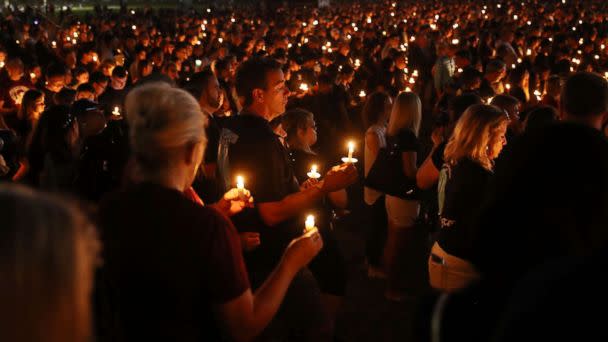The Nation
The Gun Industry Is Weaker Than It Looks
It’s vulnerable when it comes to the one thing it cares about most—money.
By George Zornick February 21, 2018
 AR-15 style rifles made by Battle Rifle Co. on display in a retail shop in Texas. (AP Photo / Lisa Marie Pane)
AR-15 style rifles made by Battle Rifle Co. on display in a retail shop in Texas. (AP Photo / Lisa Marie Pane)
The Parkland shooting unfolded with a grim familiarity. News alerts that shots had been fired at a Florida high school quickly gave way to reports of multiple casualties and then a final, horrible number: 17 dead, students and teachers. Republicans offered their thoughts and prayers as ambulances pulled away from the school, and they also warned against any “knee-jerk” reactions to the killings, in the words of House Speaker Paul Ryan.
But then something rare happened: The students at Marjory Stoneman Douglas High got angry and declared war on inaction. “Every single person up here today, all these people, should be at home grieving. But instead we are up here standing together, because if all our government and president can do is send ‘thoughts and prayers,’ then it’s time for victims to be the change that we need to see,” said student Emma Gonzalez at a rally, speaking through her tears and while still holding notes for her AP Government class. “Politicians who sit in their gilded House and Senate seats funded by the NRA telling us nothing could have ever been done to prevent this—we call BS.” Video of her speech quickly went viral, and “We call BS” became a new rallying cry for the gun-control movement. In short order, plans came together for a nationwide student walkout and a march on Washington.
Fatalism about what these young people—and the larger gun-control movement—can achieve is unwarranted and self-reinforcing. Last November in Virginia, the National Rifle Association backed 13 State House candidates in competitive races and Republican Ed Gillespie for governor. Twelve of those candidates lost (the 13th won on a coin toss), and Gillespie got trounced. At the state and local levels, gun-control advocates have been able to pass measures that Congress has failed to enact, like assault-weapons bans and expanded background checks. It’s worth remembering that the movement didn’t really exist in its current form before the Sandy Hook massacre in 2012. Most of the major gun-control groups today were formed in response to that shooting, and Democrats rarely advocated for gun control in the decades prior to that. Given time, this movement can grow—and win—if it has confidence in itself and its arguments.
That’s not to discount the immediate limits of our ossified political system, especially with Donald Trump in the White House after getting over $30 million from the NRA. Trump will never sign significant gun-control legislation, and a Congress that couldn’t even ban bump stocks after the Las Vegas massacre won’t pass it anyway. But as the movement works to elect a different Congress and president, there’s another thing it can do. It can go after the one thing that gun manufacturers value above all else, including human life: money.
These days, the gun titans are loaded with debt and facing declining consumer demand. In the same week as the Parkland shooting, Remington Outdoor Company, one of the largest gun manufacturers in the United States, announced plans to declare bankruptcy. Signs abound that other parts of the gun industry are in danger, too: According to an SEC filing, a $140 million loan to United Sporting Companies, a major middleman between manufacturers and retailers, lost half its value in 2017. Gun retailers aren’t faring much better: Gander Mountain, a big-box sports retailer that sold guns in most of its stores, went belly-up in 2017 and began to liquidate locations nationwide.
Activists can help deliver a knockout punch to these merchants of death. Divestment is one route, by making guns as radioactive as fossil fuels. In 2013, the California State Teachers’ Retirement System voted to divest itself of millions of dollars’ worth of shares in gun manufacturers. New York City’s employee pension fund did the same in 2016 and also pulled money from sporting stores like Cabela’s and Dick’s that sell guns. College students nationwide should ask their endowment offices whether they have holdings in gun stocks—and if so, challenge their colleges to dump them.
Divestment can happen at the personal level, too. Thirty-five percent of US stock funds include investments in gun and ammunition manufacturers—a staggering $17.3 billion invested in 2,120 funds. At GoodbyeGunStocks.com, you can learn whether your investment fund owns shares in gun companies. If it does, a tool on the website allows you to find gun-free funds.
Letitia James, New York City’s public advocate, has put considerable pressure on banks to stop lending to gun manufacturers, and suggests the city shouldn’t do business with them if they continue to make those loans. PayPal, Square, Stripe, and Apple Pay already don’t allow payments for firearms to be processed—what if the major banks and credit-card companies did the same?
If Congress managed to repeal the Protection of Lawful Commerce in Arms Act of 2005, gun manufacturers would no longer enjoy broad immunity from civil claims. The families of people hurt or killed by guns could finally hold manufacturers responsible for the damage they caused, with the lawsuits against Big Tobacco serving as a model. Both industries sold things that, when they worked as intended, ended countless lives.
The NRA’s power in Washington is fueled by money from the gun industry. It’s time to turn off the spigot and make it unprofitable to sell death.
Get unlimited access to The Nation for 37 cents a week! SUBSCRIBE
George Zornick is The Nation’s Washington editor.



















